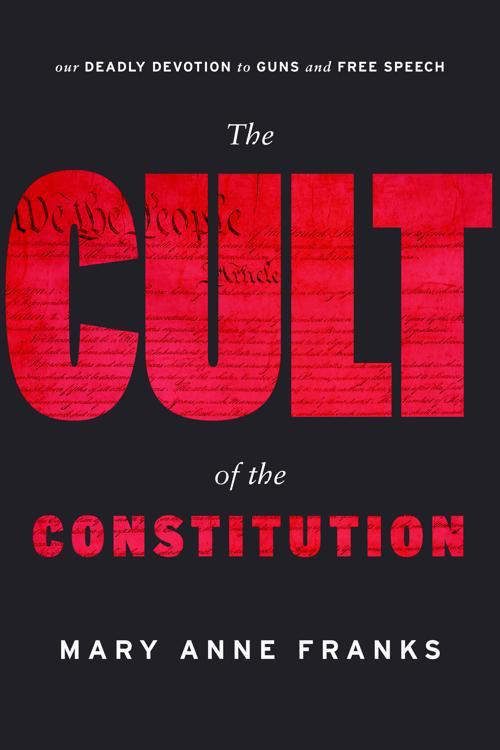Mary Anne Franks, The Cult of the Constitution

By Walter Horn

Mary Anne Franks, The Cult of the Constitution: (Stanford University Press, 2019)
No one should doubt the righteousness of the indignation that is so refulgent in Mary Anne Franks’ book, The Cult of the Constitution . And there should be little doubt that the hoary document that currently holds U.S. citizens in an anti-democratic hammerlock is the object of a cultish devotion. That particular gospel was designed by and for propertied white males and since its ratification has largely been employed, mostly by more white men, in a manner that guarantees the continuance of the 18th century hierarchy it was originally created to protect. Remember, when blacks and women did finally get the vote, it was only because the ruling brotherhood deigned to allow it.
Some will be quick to point out that a sizable segment of the white male community consists of liberals who have often allied with the non-white, non-male contingent in continuing efforts to broaden their rights. Franks has little patience for such rejoinders. In fact, much of her book consists of examples of how ostensibly liberal groups have harmed women and minorities, particularly through their advocacy of loosening restrictions on free speech. Such support, in Franks’ view, may have been more harmful to women and blacks than the explicit championing of the superiority of white males over all other animals on Earth.
The objects of Franks’ holy rage start with the present-day Republican party and radiate outward from there. She writes that 2016 was the year that “an openly misogynist, racist, and xenophobic billionaire reality star was selected as the presidential nominee for the Republican Party” and muses that it is
“hard to imagine a more obvious manifestation of the desperate attempt by white male supremacy to reassert itself….His lack of relevant experience or demonstrable skills did not matter, nor did his ...multiple business failures, his infidelities or multiple marriages, nor even his boast on tape about sexually assaulting women….The party of ‘family values’ and ‘personal responsibility’...rallied behind him as he mocked the disabled, called for a ban on Muslims, insulted the families of dead veterans, and made clear that he would use the presidency to enrich his own personal wealth...Donald Trump did not need to be morally upstanding, financially responsible, or even minimally competent. He only had to reassure America that he would return it to ‘the good old days’ of white male supremacy.”
Certainly, there is truth in this indictment. That the bragging television huckster, crowing about bleach injections as a cure for coronavirus infections, was and remains a grand embarrassment, not only to the GOP but to the U.S. as a whole, is as clear as anything can ever be in the political realm. Franks is also convincing when she suggests that it is no accident that lowering taxes, deregulating industries, packing courts with anti-choice judges, and all the other familiar planks of traditional Republican platforms have tended to serve the white male population at the expense of less fortunate societal groups. Few pundits may have ever stopped to ask Trump or his MAGA friends exactly when America was “great,” but it’s no mystery to Franks. It was back when there was no question who ruled the roost and there was little danger that the conditions then prevailing might be changed as a result of increased immigration or more widespread minority voting. It was a time before anyone worried that Jews might “replace us” or there was a chance we would be troubled by discussions of the Tulsa Massacre on nightly news broadcasts. As the Constitution is the stoutest shield relied on by white male supremacy, there should be little surprise that it is devoutly worshipped by those who live by the creed that “if you’re white, you’re alright; if you’re black, get back, get back.”
The news Franks wants to bring is that the ACLU contingent--those liberals who have defended the right of neo-Nazis to march and for unlimited money to be expended by corporations in political campaigns--are not much to be preferred to NRA members and other right wingers. Liberals, conservatives: they’re both reprehensible in Franks’ book. The left may have long understood that those libertarians who want to deregulate the economy are bad for have-nots, but Franks believes there hasn’t been much cognizance among self-styled “progressives” that free-speech warriors are little better for the oppressed among us than are followers of Milton Friedman. As she sees it, if money is allowed to talk, bullshit will never walk.
I have written about the worship of the U.S. Constitution elsewhere, and I’m convinced that Franks is quite correct about both the existence of this cult and its unhealthy malevolence. I also agree with her about democracy’s dependence on an axiom of equality. Sanford Levinson has complained that Franks’ reliance on the “golden rule” and Kant’s categorical imperative (to follow all and only those maxims that we can universalize) is “facile.” It is unclear to me whether Levinson, a longtime supporter of the ACLU, is there displaying some level of defensiveness concerning Franks’ savage criticism of that organization throughout her book. Either way, I believe he’s wrong about this matter: If one does not start with the underivable principle that all people are equal, no democratic system can get off the ground.
May we then infer that Franks’ entire book is as right as rain? I think not. In my view, her book suffers badly from its sole focus on the First and Second Amendments as Constitutional evils and its exclusive reliance on non-discrimination/equal protection (i.e., the Fourteenth Amendment) as a basis for an authentically democratic system of self-government. I think, too, that her attacks on free expression lack comprehension of the fact that a particular interpretation of what freedom of expression requires is entailed by other axioms of democracy, principles that go entirely unrecognized in her book. In democratic polities, the (equally treated) people must indeed get what they want within limits imposed by equal treatment and protection. But a correct understanding of self-government will show that there can be no authentically democratic representative government wherever political speech is narrowly restricted. As the majority may not want what Franks wants, her desires may not be consonant with authentic democracy, even where equal treatment is fastidiously recognized and implemented. That’s simply an unfortunate consequence of self-sovereignty.
Franks devotes one chapter to the cult of gun ownership in America and two more chapters to the cult of free speech--including alleged types that utilize access to the internet. Her arguments are quite compelling. But even if one agrees with all of that material (and there is definitely much to agree with), when I think of the fatal flaws in the U.S. Constitution, I find that those two doctrines are accompanied by many others. Surely, Franks is correct that there is no God-endowed right to carry handguns either into the House or Senate Chambers or into one’s local grocery store. And Justice Holmes was convincing when he suggested that there can hardly be an inalienable right to loudly lie about whether the theater one is sitting in is on fire. However, there also seems to be no natural right to be free from any quartering of soldiers in one’s home, or to the chance of facing a grand jury if one is accused of certain crimes. Arguably, there isn’t even any right to the unfettered practice of one’s favorite religion.
As much of the U.S. Bill of Rights isn’t easily defensible on solid philosophical grounds, most people will end up relying either on their intuitions or utility considerations whenever the existence of such alleged rights is questioned. Perhaps Franks would say that her focus on just the two dubious rights involving guns and speech can be defended on the grounds that those are the ones that have produced the most suffering among women and minorities. But even if that is true, I doubt the Bill of Rights is the worst part of the U.S. Constitution. Suppose those two items were struck, and suppose too that non-whites and women had been granted voting rights at the country’s inception: the system Madison and his cronies set up would remain both extraordinarily anti-democratic and weirdly inefficient as contemporary constitutional democracies go.
The bicameral legislature and the ability of each branch to make absurdly anti-democratic rules, the for-life SCOTUS appointments, the absence of voting rights for 16- and 17-year-olds, the extraordinary obstacles placed in the way of amendment, the crazy quilt of power separations, the inability to recall no-longer-wanted officials--all these serve to make it nearly impossible for the majority of citizens ever to get what they want. There’s almost nothing in Franks’ book on any of those glaring flaws. That might be fine, of course. One need not write about everything wrong with the U.S. Constitution: indeed, a book that attempted that would necessarily be very, very long. But one should not suggest, as Franks does, that one is setting forth the principal or most important problems when one has actually just grabbed two of many one might have written about--even if those two are legitimately awful.
In addition, Franks’ own apparent devotion to The Declaration of Independence and her use of that other gospel as a dispositive refuter of Constitutional provisions whenever she finds a conflict between the two documents is silly. John Locke makes no better sacred Prophet than James Madison. On the matter of gun ownership and use, Franks provides absolutely compelling utility arguments to demonstrate that wide ownership of guns is very bad for any society--and, unsurprisingly, is particularly harmful to women and blacks. NRA advocates likely wouldn’t care about that, however, since they think people have a natural right to guns whether or not it is for general good or ill. (I mean, they think it’s for good, of course, but they wouldn’t care much if it weren’t.) Amid her impressive array of facts about the negative effects of open carry and “stand your ground” laws, Franks pauses to make a half-hearted argument according to which support for an inalienable right to bear arms is self-contradictory. But on that matter, she’s not convincing at all. It strikes me as highly unlikely that very many gun toters should be expected to be Lockean social contract theorists. They are much more likely to simply believe that God endowed Americans with a right to bear arms--militia or no militia--and that the Founders had the good sense to realize it.
With respect to the First Amendment, both the slant of everyday media and current jurisprudence drive Franks up the wall. There seems to her to be far too much concern for the alleged plight of conservative pundits and corporations to have their unregulated and otherwise unbothered say, and almost none for women who are harassed on the street or suffer from pornographic bullying on the web. Tears are shed for right wing professors or Ann Coulter-types when they are booed at campus speeches, but when black or leftwing spokespersons get death threats, nobody seems to care too much. How, she wonders, can people worry about protecting some giant internet company from liability when their sites are used to enable the raping of young girls? The right wing, and particularly its deep-pocket funders (like the Koch brothers) are ridiculed for their flip-flops and other evidences of hypocrisy, but the ACLU seems to Franks even worse for lining up with ostensibly libertarian free speech absolutists and their ilk, and for taking money from evil corporations who want to lie with impunity.
As white supremacists and corporate executives openly espouse far different principles from her own, Franks isn’t really surprised by their positions here--even when they are hypocritical. But when supposedly progressive entities like the ACLU line up with Nazis in Skokie or take millions from the tobacco industry, her anger becomes palpable. Free speech issues are notoriously tricky, but Franks is less interested in legal niceties than in outcomes that are likely to make lives better for women and minorities. What should the devotee of democracy think about these matters?
First, I think we must agree with her that the Mill/Holmes/Popper/Douglas doctrine of allowing wide, repetitive dissemination of nonsense because of some alleged “marketplace of ideas'' that responds to an abundance of baloney by magically producing truths is both ridiculous and harmful. But in my view, there is a better, non-consequentialist defense available. It is that certain types of speech should remain unregulated because authentic democracy requires it. While carefully demarcating that (political) area is no easy task, it isn’t rocket science to understand that it does not include whistling, stalking, or making lude gestures at strangers, shouting racist, homophobic, or anti-Semitic epithets, bullshit advertisements, chatrooms for pedophiles looking for runaways, or the posting of anyone’s picture on the internet without their consent. Obviously, confident pronouncements of this type get harder to make when the subject actually does involve political speech or acceptable types of protest. As Franks is writing a polemic, she mostly ignores those niceties when she is mid-diatribe, but the rest of us should remember that getting such details right is not easy.
Perhaps the most important item that Franks seems to me to have missed is that the recognition of human equality, while essential, is not sufficient to produce a meaningful constitution for a modern democratic polity. One needs other axioms to provide for (presumably representative) self-government. And those additional principles entail generally unregulated political speech and associated political freedoms. It is also true that those axioms are absolutely inconsistent with provisions in the U.S, Constitution of which Franks takes no notice at all. Among the most perplexing problems for contemporary democrats is the fact that even if we could prevent every wrong that a sense of equality as keen as Franks’ finds offensive, nothing would prevent a completely democratic society from being cruel in other ways. That is a tough pill to swallow for those of good will.
In her Introduction, Franks talks about her Southern Baptist upbringing. She says she eventually lost her religious faith, but her book seems to me to be full of the same sort of fire and brimstone she might have encountered in her church in Pine Bluff, Arkansas. Even the atheists and agnostics among us should, I think, agree that the world would be a better place if governments acted more in accordance with Franks’ teachings than with the reprehensible precepts of Trump’s Republicans, but I think that none of us should forget that this new, gentler world might not be any more democratic than that being sought by today’s GOP. In a word, one must choose. A true democrat cannot expect any guarantee of the elimination of various types of evil: if we simply cannot live with those that may well remain, we will have to admit to the abandonment of democratic principles. I, for one, would be willing to take my chances with real self-government.

About the Author
Walter Horn is a philosopher of politics and epistemology.
His 3:16 interview is here.
Other Hornbook of Democracy Book Reviews